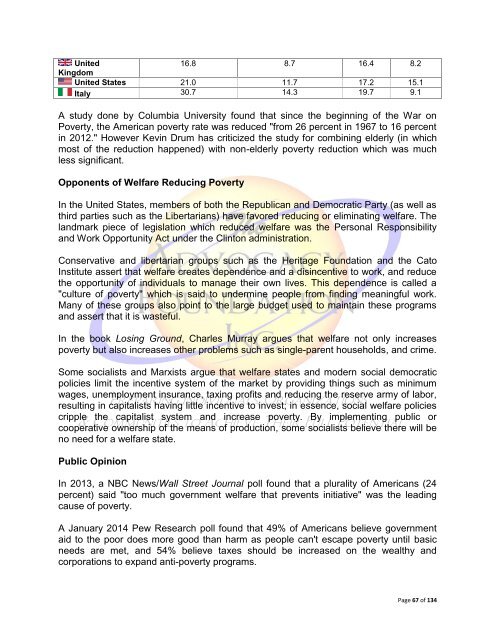Concentrated Poverty
Concentrated Poverty
Concentrated Poverty
Create successful ePaper yourself
Turn your PDF publications into a flip-book with our unique Google optimized e-Paper software.
United<br />
16.8 8.7 16.4 8.2<br />
Kingdom<br />
United States 21.0 11.7 17.2 15.1<br />
Italy 30.7 14.3 19.7 9.1<br />
A study done by Columbia University found that since the beginning of the War on<br />
<strong>Poverty</strong>, the American poverty rate was reduced "from 26 percent in 1967 to 16 percent<br />
in 2012." However Kevin Drum has criticized the study for combining elderly (in which<br />
most of the reduction happened) with non-elderly poverty reduction which was much<br />
less significant.<br />
Opponents of Welfare Reducing <strong>Poverty</strong><br />
In the United States, members of both the Republican and Democratic Party (as well as<br />
third parties such as the Libertarians) have favored reducing or eliminating welfare. The<br />
landmark piece of legislation which reduced welfare was the Personal Responsibility<br />
and Work Opportunity Act under the Clinton administration.<br />
Conservative and libertarian groups such as the Heritage Foundation and the Cato<br />
Institute assert that welfare creates dependence and a disincentive to work, and reduce<br />
the opportunity of individuals to manage their own lives. This dependence is called a<br />
"culture of poverty" which is said to undermine people from finding meaningful work.<br />
Many of these groups also point to the large budget used to maintain these programs<br />
and assert that it is wasteful.<br />
In the book Losing Ground, Charles Murray argues that welfare not only increases<br />
poverty but also increases other problems such as single-parent households, and crime.<br />
Some socialists and Marxists argue that welfare states and modern social democratic<br />
policies limit the incentive system of the market by providing things such as minimum<br />
wages, unemployment insurance, taxing profits and reducing the reserve army of labor,<br />
resulting in capitalists having little incentive to invest; in essence, social welfare policies<br />
cripple the capitalist system and increase poverty. By implementing public or<br />
cooperative ownership of the means of production, some socialists believe there will be<br />
no need for a welfare state.<br />
Public Opinion<br />
In 2013, a NBC News/Wall Street Journal poll found that a plurality of Americans (24<br />
percent) said "too much government welfare that prevents initiative" was the leading<br />
cause of poverty.<br />
A January 2014 Pew Research poll found that 49% of Americans believe government<br />
aid to the poor does more good than harm as people can't escape poverty until basic<br />
needs are met, and 54% believe taxes should be increased on the wealthy and<br />
corporations to expand anti-poverty programs.<br />
Page 67 of 134

















